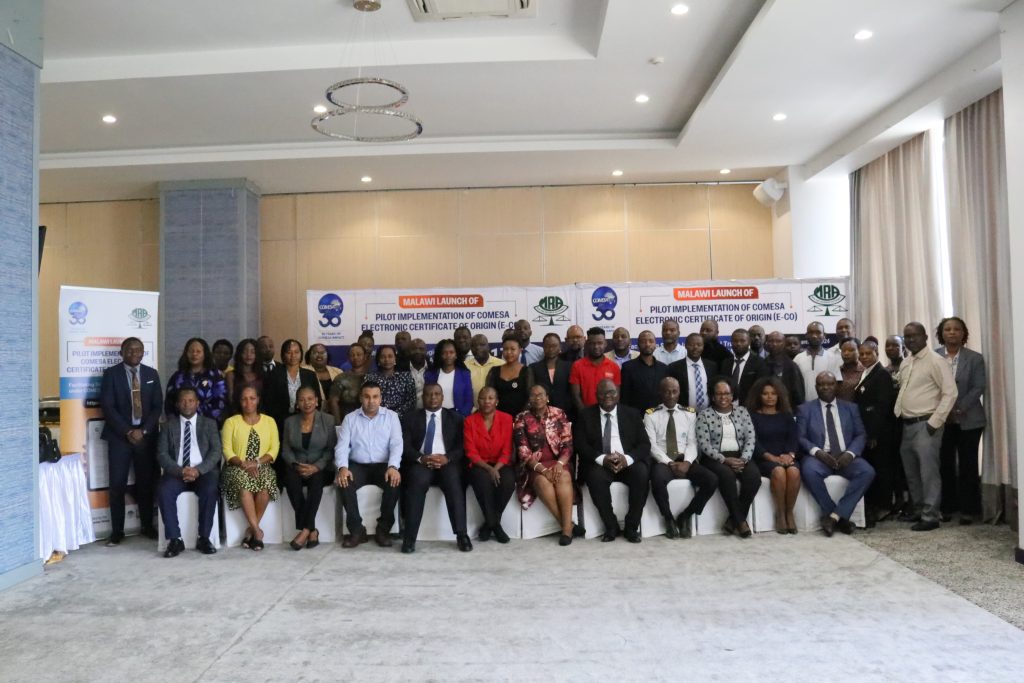
Malawi and Zambia have launched the implementation of the COMESA Electronic Certificate of Origin (eCO) Programme meant to enhance trade efficiency by simplifying the process for exporters and reducing the time and costs associated with obtaining traditional certificates.
Since its introduction in 2000, the COMESA Certificate of Origin has been issued and processed manually, a method that has often introduced inefficiencies and administrative burdens.
Recognising these challenges, the 32nd meeting of the COMESA Council of Ministers urged Member States in 2014 to adopt and implement the eCO system.
Fast forward to 2024, the Kingdom of Eswatini became the first COMESA country to launch the implementation of the eCO in November. It was followed by Malawi and Zambia in December of the same year.
The launch in Malawi on 17 December was characterised by pomp and splendour as senior government officials described the event as a game changer for trade in the country.
Permanent Secretary in the Ministry of Trade, Christine Zakeyo, underscored the importance of the eCO in promoting trade within Malawi and beyond.
Ms Zakeyo stated that the launch aligned seamlessly with the Malawi 2063 Vision, particularly the pillar on industrialization and economic transformation, adding that a modernized trade facilitation process is integral to achieving sustainable economic growth.
“By simplifying trade, we empower our private sector, attract investment, and create jobs for our people. Moreover, the adoption of the e-CO system reflects our dedication to leveraging technology as a driver of economic progress,” she added.
She hinted that as Malawi embraces the digital economy, the Government is creating an environment that fosters innovation and competitiveness, which are critical for the Country’s industrialization journey.
Zambia launched the implementation of the eCO on 31st December 2024 and described the system as a significant step towards deepening efficiency in the country’s trade facilitation agenda.
Permanent Secretary in the Ministry of Commerce, Trade and Industry Lillian Bwalya reaffirmed government’s support towards the initiative and implementation of instruments of trade facilitations such as the eCO, stating that this will help with the advancement of Zambia’s development goals. She added that so far about 500 stakeholders have been trained in using the system and more are expected to join this group.
Secretary General Chileshe Mpundu Kapwepwe commended both countries for advancing regional integration using digital platforms. She pointed out that the introduction of the eCO is a transformative step towards addressing challenges, showcasing the collective commitment to leveraging technology for economic growth and improved trade facilitation.
“As we celebrate 30 years of COMESA’s impact, this moment provides an opportunity to reflect on our regional integration journey – highlighting achievements, addressing challenges and charting a path forward for deeper economic cooperation, sustainable growth and development across our region,” said Ms. Kapwepwe who was represented at both events by Ms Balness Sumani Senior Customs Affairs Officer.
The Secretary General commended the European Union for their support through the 11th European Development Fund Trade Facilitation programme. Through this programme, the COMESA Secretariat has extended comprehensive support to Member States in the implementation of the electronic Certificate of Origin System. More Member States are expected to launch the eCO this year.

